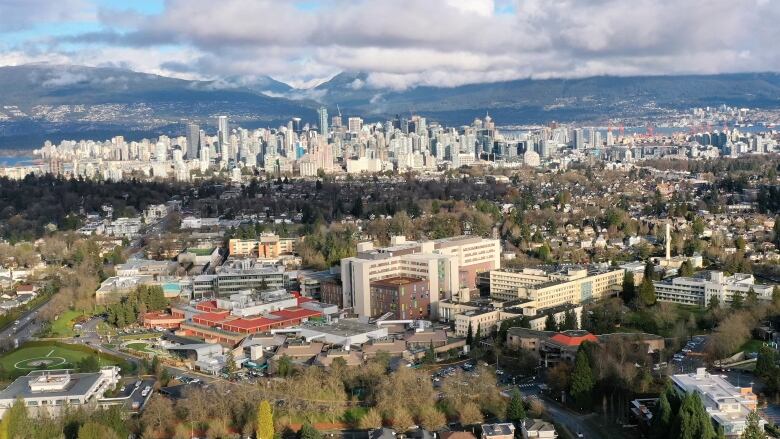Should Metro Vancouver municipalities be combined? Half of the region's residents think so, poll finds
Residents who are more satisfied with their municipal government less likely to support amalgamation: poll

New findings fromthe Angus Reid Institute show that half of Metro Vancouver residents are open to combiningsome or all of the region's 21 municipalities.
An online survey conducted last month found 42 per cent support partial amalgamation, and eight per cent support merging all municipal governments in Metro Vancouver.
Among respondents, there is most enthusiasm to amalgamate communities in the Tri-Cities (35%),North Shore (34%)and Pitt Meadows and Maple Ridge (31%).
Nearly half, or 48 per centof respondentsin the North Shore say they support a merger of North Vancouver and West Vancouver.
Meanwhile 41per cent, or two in five residents in the Tri-Citiesbelieve Coquitlam, Port Coquitlam and Port Moody should come together.
Shachi Kurl, president of the Angus Reid Institute, says the openness to a more consolidated government coincides with one's satisfaction with their government, and whetherthey think it's more effective for multiple communities to tackle top issues like housing and crime as one governing body.
"You're dealing with different municipal issues and there may be some formal or informal sharing of resources," said Kurl.
"In many cases, there is an increasing number of people who are living in these places saying, 'Actually, it would make more sense to maybe get together, to pool our resources, and to have amore coherent policy.'"
Suburbs near Vancouver less open to merging
Respondentswere far less open to the ideaof a combined Vancouver-Burnaby (17%) and Surrey-Langley Township-Langley City (23%).
Kurl says she is not surprised suburbs in proximity to Vancouver are less open to merging.
"Vancouver tends to march to the beat of its own drum," said Kurl. "Merging with Vancouver in essence is inheriting Vancouver problems or that could be the mindset."
Kurl also notes the money involved. "They see [Vancouver's]money for policing, public safety and road amenities and say they're not interested in subsidizing the costs of the City of Vancouver."
Kurladds that those who have a negative perception of government performance are more open tothe idea of amalgamation or say they're not sure.
"If you're happy with the way your city is running and if you feel like you're getting value for money, then you're far less likely to say, 'Yeah, let's go merge with the place next door or on the other side of the river.'"
The institute has also found that those who oppose any form of amalgamationare likelierto offer praise on issues of housing and crimewhile still being critical of their government, compared to those who want amalgamation.
Housing, homelessness, crime considered top issues
The institute also polled Metro Vancouverites on what they consider the biggest priorities for local governments.
Housing affordability ranked highest across the board, with 49 per cent saying it is the top issue facing the region, followed byhomelessness and poverty (31%) and crime and safety (29%).
Themajority say their previous municipal governments had done a poor job of handling housing policy (81%), poverty (77%), the opioid crisis (70%) including the largest number ofrespondents in Vancouver, at 82 per cent and crime and safety (64%).
Views on policing and crime
When it comes to policing,59 per cent say more resourcesshould be allocated to social welfare services, while the rest say it should go to increasing police presence in high-crime areas.
The findings also show a wider-held perception that crime has been increasing 61 per cent say they believe there has been more crime in their community in the last five years, with the largest number of respondentsrecorded in Surreyat 69 per cent.
Of those who believe there has been more crime, 49 per cent believe the trend is specific to Metro Vancouver while 43 per centsay they believe the increase is a national trend.
The institute also notes the rate of police-reported crime has fluctuated in the last several years, rising from 2018-2020 but dropping in 2021.
Metro Vancouver's Crime Severity Index score, which is calculated by Statistics Canada,is higher than the national average, but well below other municipalities like Kelownain B.C.'sInterior, Lethbridge, Alta., Moncton, N.B. and Winnipeg, Man.
The Angus Reid Institute conducted an online survey from Oct. 6-12among a randomized sample of 1,376 adults residing in Metro Vancouver, who are members of the Angus Reid Forum. The findings carry a margin of error of +/- 3 percentage points, or 19 times out of 20.












_(720p).jpg)


 OFFICIAL HD MUSIC VIDEO.jpg)
.jpg)



























































































